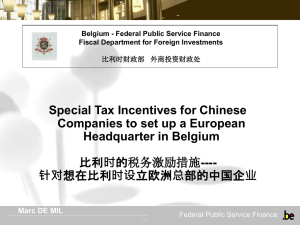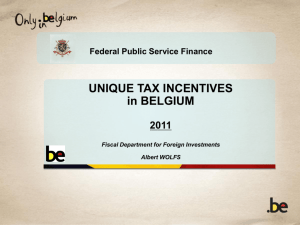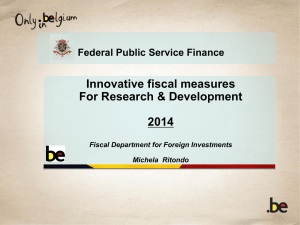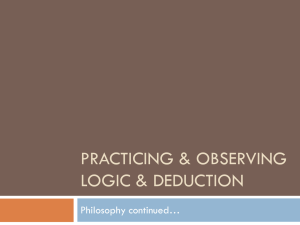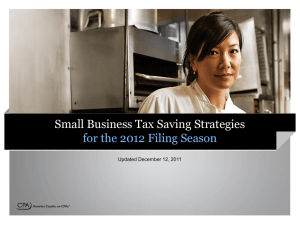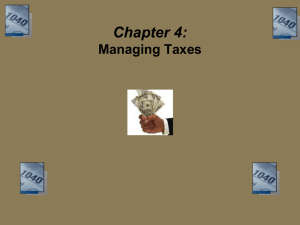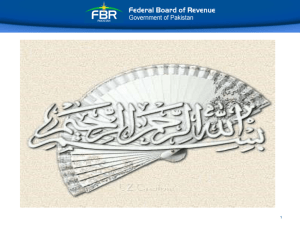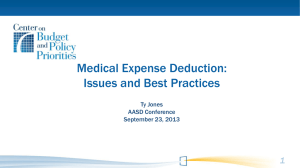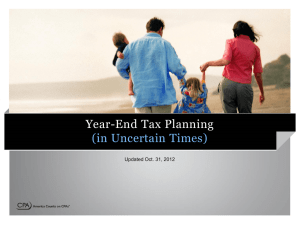Notional Interest Deduction
advertisement
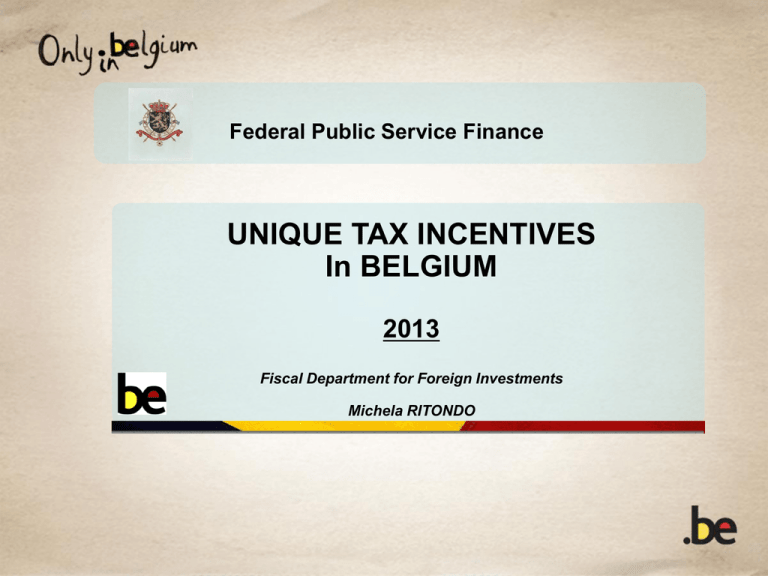
Federal Public Service Finance UNIQUE TAX INCENTIVES In BELGIUM 2013 Fiscal Department for Foreign Investments Michela RITONDO 2 Belgium Effective (Average) Corporate Tax Rate (ECTR) 2012* *(based on asset and source of finance) Especially in Belgium, the ECTR is considerably below statutory tax rates (-8,1%) Sources : Taxation trends in the EU 2012 edition, Eurostat Tax Rates of OECD Countries, AEI International Tax Database, OECD Tax Database and World Bank 3 Belgium Effective (Average) Corporate Tax Rate (ECTR) 2012* UK Japan France USA Netherlands Germany Italy Belgium *(based on asset and source of finance) Especially in Belgium, the ECTR is considerably below statutory tax rates (-8,1%) Sources : Taxation trends in the EU 2012 edition, Eurostat Tax Rates of OECD Countries, AEI International Tax Database, OECD Tax Database and World Bank INVEST IN BELGIUM www.invest.belgium.be 1. Notional Interest Deduction 2. Tax Ruling 3. Unique tax features for R & D 4. Dividend withholding tax exemption 5. Holding regime 6. Expatriate status 1. Notional Interest Deduction What is it? A notional interest calculated and deducted yearly from the taxable basis used to off-set operational or financial income (thus lowering effective tax rate) 1. Notional Interest Deduction Who? Companies subjected to - Corporate tax Non-residents / Corporate Tax Notional Interest Deduction How does it work ? Annual Tax Deduction = EQUITY (in the opening balance sheet of the taxable period) X RATE (10-year OLO) 1. Notional Interest Deduction « Qualifying » equity Equity = total equity as defined under Belgian GAAP (includes retained earnings) in the opening balance sheet of the taxable period “adjusted” to avoid double use and abuse. 1. Notional Interest Deduction Interest Rate RATE = annual average of the monthly published rates of the long term Belgian Government Bonds (10-year OLO) Fixed yearly: for 2013 (Tax Year 2014): 2,742 % 3,242 % (SME) 1. Notional Interest Deduction EXAMPLE 1: (Return on Equity: 3,5%) P&L Account Profit before tax N.I.D. (2,742 %) Assets Group Financing 100 000 Liabilities Share Capital 100 000 Before N.I.D. After N.I.D 3500 3500 / - 2742 Taxable 3500 758 Corporate Tax (33,99 %) 1190 258 Effective Tax Rate 33,99 % 7,3 % 1. Notional Interest Deduction EXAMPLE 2: (Return on Equity: 4%) P&L Account Profit before tax N.I.D. (2,742 %) Assets Group Financing 100 000 Liabilities Share Capital 100 000 Before N.I.D. After N.I.D 4000 4000 / - 2742 Taxable 4000 1258 Corporate Tax (33,99 %) 1360 427 Effective Tax Rate 33,99 % 10,6 % 1. Notional Interest Deduction Assets EXAMPLE 3: Business Assets 100 000 Net Result (Return on Equity) ≤ 2,742 % Liabilities Share Capital 100 000 Effective Tax Rate 0% 3,5 % (Previous slide) 7,3 % 4% 10,6% (Previous slide) 5% 15,3 % 6% 18,4 % 1. Notional Interest Deduction Other particularities Permanent measure No ruling nor agreement is needed Suppression of the 0,5% capital duty as of 1/1/2006 EU compliant 2. Tax Ruling Advanced decisions or ruling is about creating CONFIDENCE to invest in Belgium; The investor describes the facts, allowing the tax administration to determine, in advance, how the tax laws are to be applied on a CASE BY CASE BASIS It ensures a LEGALLY BINDING ACCURATE FORECAST of all the tax implications of your investment project 2. Tax Ruling Unlimited application field for ruling: Transfer pricing Business Restructuring Deductible expenses Financing Branches Bonded warehouses, etc. 2. Tax Ruling Characteristics of the Belgian ruling Ruling on all kind of taxes (Corporate, Personal, VAT,..) Case-by-case ruling in a new open culture Legal certainty for investors In accordance with international rules Open to potential AND existing investors Legally binding for a 5 year renewable period Economic “substance” required 2. Tax Ruling PARENT COMPANY e.g. USA / Japan… Belgian DISTRIBUTION Centre Operational Companies Operational Companies Belgian SERVICES Centre Cost plus % case-by-case ruling * OECD accepted norm: arm’s length standard * 2.1. European Distribution Centre Income approved by the ruling Commission (ex. 105% of operational exp.) mark up 5% on operational expenses Expenses Income Transport (27 000 €) Warehousing (27 000 €) Staff (46 000 €) Interco Reinvoicing European Distribution Centre 100 000 € Income Expenses 105 % X 100 000 € = 105 000 € 105 000 € - 100 000 € 5 000 € profit Corporate tax rate Corporate tax 33,99 % 1 700 € 2.1. European Distribution Centre Income approved by the ruling Commission (ex. 105% of operational exp.) mark up 5% on operational expenses with N.I.D. (ex: Equity 100 000 €) Income Expenses Transport (27 000 €) Warehousing (27 000 €) Staff (46 000 €) Interco Reinvoicing European Distribution Centre 100 000 € Income Expenses Profit 105 % X 100 000 € = 105 000 € 105 000 € - 100 000 € 5 000 € Notional Interest Deduction -2 742 € Taxable basis 2 258 € Corp.tax rate: 33,99 % Corporate tax 767 € 3. Unique tax features for R & D 1/ Patent income deduction What is it ? Deduction of 80% of the income from patents from the taxable basis, resulting in an effective tax rate of maximum 6,8% on this income Who can benefit ? Belgian companies and Belgian establishments of foreign companies 3. Unique tax features for R & D 1/ Patent income deduction Example Patent income: Deduction: Taxable basis: Corporate Tax (33,99%) Net income after tax: 100 ( 80) 20 (6,8) 93,2 6,8 % Effective Tax rate: 3. Unique tax features for R & D 1/ Patent income deduction Patents concerned self-developed or co-developed by a Belgian company or branch; acquired by a Belgian company or branch provided they are being further developed in Belgium or abroad (by acquisition, or license,…) Large companies must have in-house R&D activities in a R&D center that qualifies as branch of activity As of 1 January 2013 SME’s are exempted from the R&D center requirement 3. Unique tax features for R & D 1/ Patent Income Deduction Calculation of the deduction For patents that are licensed: 80% of the patent income received, to the extend the income is at arm’s length For patents that are used in the production process: deemed deduction of 80% of the at arm’s length royalty that would have been received had the patents been licensed to unrelated third parties Schematic overview 3. Unique tax features for R & D 1/ Patent Income Deduction Highly competitive measure Very low effective tax rate of maximum 6,8% and absence of any capping rules; Tax deduction in addition to normal tax-deductibility of R&D related expenses; Investment deduction for R&D related investments and patents; Can be combined with Notional Interest Deduction for invested equity, etc. 3. Unique tax features for R & D 2/ Investment deduction for R&D related inv. and patents Investment deduction for R&D related investments: for assets which aim to promote R&D of new products and advanced technologies which are environment-friendly : deduction of 14,5% on the investment value (in one shot) OR 21,5% on the annual depreciation (spread deduction) Investment deduction in patents acquired or self-developed by the company deduction of 14,5% on the investment value NB: In case of insufficient profits, deduction carried forward for an unlimited period . 3. Unique tax features for R & D 3/ Exemption from withholding tax on the remunerations of researchers, in favour of employers Principle: the salary withholding tax is normally retained on the remunerations paid to the researcher, but the amount of tax so retained must not be totally paid to the Revenue Collector (= extra financial means for the employer) 75% exemption For researchers with a specific degree, engaged in R&D program INVEST IN BELGIUM – increase your profits Example Manufacturing company with a R&D division: Share capital: 100 000 (of which 20 000 = contributed patent value) Return on equity: 12% Net profit: 12 000 (of which 3 000 = patent income ; 9 000 = product revenue) To deduct Invest. ded. on patents: Patent Income Ded.: N.I.D. Taxable basis: Corporate Tax: Effective tax rate: 14,5% x 20 000 = 80% x 3 000 = 2,742% x 100 000 = 2 900 2 400 2 742 3 958 (3 958 x 33,99%) = 1 345 11,2% 4. Dividend withholding tax exemption Conditions to benefit be resident in a country with which Belgium has concluded a double tax treaty; the beneficiary holds a participation of at least 10% in a Belgian subsidiary, for an uninterrupted period of at least 12 months = low participation threshold; 4. Dividend withholding tax exemption Parent company (treaty partner of Belgium) • No WHT • 10% shareholding • No LOB • 12 months Belgian Subsidiary 5. Holding regime Participation exemption dividends received : deduction of 95% Deductibility of interest paid to acquire shares No capital duty Exemption of realized capital gains on shares if minimum holding period of 12 months is fulfilled 6. Expatriate status For foreign executives and managers temporarily detached in Belgium : Tax free expatriate allowance (cost of living, cost of housing, tax equalization) operational entity: 11 250 € / an HQ or R&D centre: 29 750 € / an Reimbursement of non-repetitive expenses (installation costs, moving expenses, school fees) unlimited amount tax free « Travel exclusion »: workdays performed outside Belgium tax free in Belgium 6. Expatriate status For employers: No tax, no social security contributions on expatriate allowances and reimbursement of expenses Deductible from Corporate tax INVEST IN BELGIUM – increase your profits Need to know more ? Federal Public Service Finance Fiscal Department for Foreign Investments Rue de la Loi, 24 (Parliament Corner) 1000 Brussels - BELGIUM Michela RITONDO Email: michela.ritondo@minfin.fed.be Tel.: +32 257 938 69 Fax: +32 257 951 12
